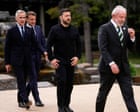EU’sKallascontinues:
On Ukraine, the European Union is doing its part here too, not least becauseUkraine is Europe’s first line of defence.We know that Russia responds to strength and nothing else.
She highlights the importance of the 18th sanction package proposed by the EU, saying that “every sanction weakens Russia’s ability to fight this war.”
But she ends on a warning again:
Wehave to do more for Ukraine, for our own security too.
To quote my friend Nato secretary general Mark Rutte:if we don’t help Ukraine further, we should all start learning Russian.
The stronger Ukraine is on the battlefield today, the stronger they will be around the negotiation table when Russia finally is ready to talk.
Opening the debate in the European Parliament, the EU’s foreign policy chiefKaja Kallaswarns:
We are living invery dangerous tough times.
Russia is already a direct threat to the European Union.
Russia is violating our airspace, conducting provocative military manoeuvres near EU borders, targeting our trains and planes, attacking our pipelines, undersea fibre optic cables and electricity grids, assaulting our industry, including companies supporting Ukraine, and is recruiting criminals to carry out sabotage attacks, and it is steadily building up its military forces and expanding its nuclear arsenal.
Last year,Russia spent more on defence than the European Union combined.
This year, Russia is spending more on defence than its own healthcare, education and social policy combined.
This isa long term plan for a long term aggression.You don’t spend that much on military if you do not plan to use it.
She goes on to call on countries to work towards the newNato5% defence spending target as early as they can, adding:
Europe’s collective economic might is unmatched. I don’t believe that there is any threat that we can’t overcome if we act together and with our Nato allies.
Ukrainian diplomats have been left frustrated – and in some cases embittered – atDonald Trump’srefusal to make Ukraine a priority afterVolodymyr Zelenskyyflew 5,000 miles to the G7 conference in Canada only for the US president to return home the night before the two leaders were due to meet, the Guardian’s diplomatic editorPatrick Wintourreported.
The snub came a day after “one of the most horrific attacks” on the Ukrainian capital, Kyiv, during the three-year war, with the death toll from the Russian strike rising to 21, with more than 130 injured.
The move showsa dramatic shiftas the world focuses on the escalating conflict between Israel and Iran.
But where does it leaveEuropeandUkraine?
European lawmakers will be this morning discussing the upcoming Nato summit inThe Hague, looking at some of these issues.
I will bring you the key lines from their discussion.
It’sWednesday, 18 June 2025, it’sJakub Krupahere, and this isEurope Live.
Good morning.
